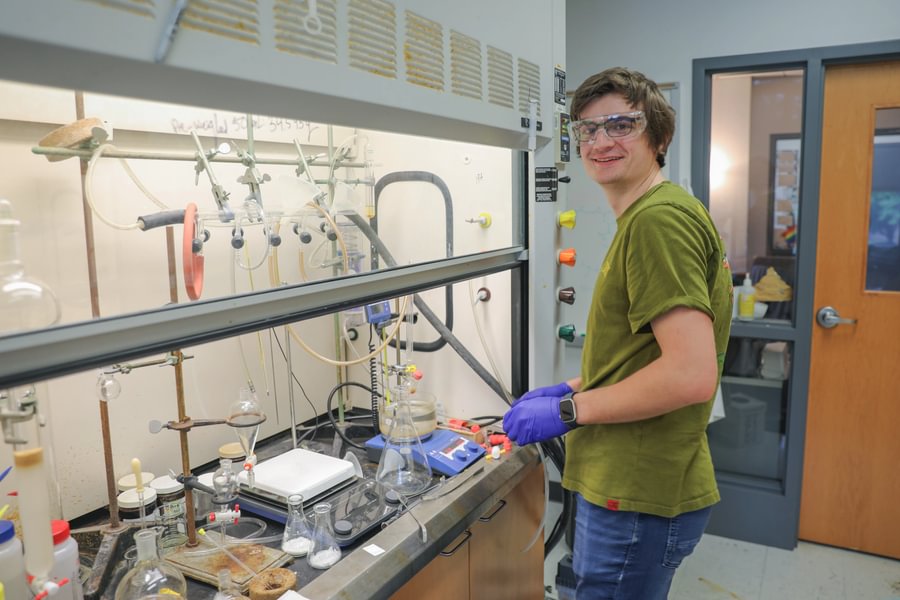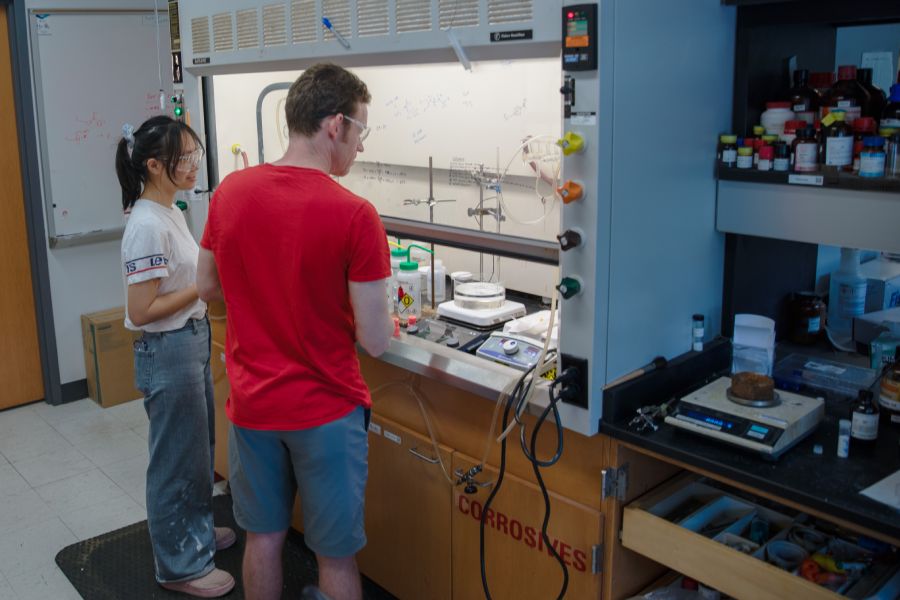
Recently, Gettysburg College received a $365,616 grant from the National Institutes of Health (NIH) to support Chemistry Prof. Timothy Funk ’00 and his three-year research project synthesizing and studying the behavior of ionizable triazine lipids for RNA delivery. The NIH grant will fund equipment, supplies, travel, and summer wages for Funk and Gettysburg College student researchers during the summers of 2025, 2026, and 2027.

Working alongside Funk this summer as part of the Cross-Disciplinary Science Institute at Gettysburg (X-SIG) are biochemistry and molecular biology (BMB) major Max Alves ’26 of Mechanicsburg, Pennsylvania; chemistry major Rachel Nguyen ’26 of Hanoi, Vietnam; BMB major Merlin Phan ’26 of Ho Chi Minh City, Vietnam; and chemistry major Molly Rossnock ’27 of Shamokin, Pennsylvania.
Alves, Nguyen, Phan, and Rossnock are working with Funk to design and study various structural features of lipids used in the formulation of lipid nanoparticles (LNPs) in Funk’s Gettysburg laboratory during year one of the grant. During years two and three, Funk and his four research students will continue synthesizing novel triazine lipids and will also spend two weeks at the University of Kentucky College of Pharmacy conducting physical and biological properties experiments.
“When you are doing research as an undergraduate here, it’s you and the professor. You’re the one doing new science. You learn what it’s really like to be a scientist.”
– Chemistry Prof. Timothy Funk ’00
Funk collaborates with Prof. Vince Venditto ’03 at the University of Kentucky College of Pharmacy on this project. The Venditto lab explores novel methods to modulate the immune system, including synthesizing novel, ionizable lipids for the development of nucleic acid-based (DNA and RNA) therapies.
“I spent about three weeks in his lab last year working with him, his postdoc, and his graduate students. As we made some of these changes to their ‘best lipid,’ we found we could make the molecules even more effective, allowing us to get more RNA into cells,” Funk said. “There is therapeutic value in being able to deliver different kinds of RNA into different kinds of tissues.”
Funk explained that numerous potential applications of RNA-based therapies exist, including silencing gene expression, gene editing, and developing mRNA vaccines, such as those produced by Pfizer and Moderna during the COVID-19 pandemic.
“RNA must get inside cells to serve its purpose, but its size, charge, immunogenicity, and instability lead to its degradation and do not allow it to pass through the cell’s plasma membrane,” he said. “One of the most effective ways to protect RNA and transport it into the cytoplasm is by packaging it in an LNP. A key component of LNP formulations is an ionizable lipid, and the lipid’s structure plays an important role in determining its ability to form LNPs with RNA and deliver the RNA into cells.”

By the end of this summer, Funk and his students will send a library of lipids to Venditto’s research team to determine how effectively they can deliver mRNA into cells. If the results are promising after extensive initial testing, there are potential opportunities to move into patients through the relationship with the University of Kentucky College of Medicine.

Through this hands-on experience, Funk is paying it forward for Gettysburg students, preparing them for graduate school or career opportunities in the sciences.
“When you are doing research as an undergraduate here, it’s you and the professor. You’re the one doing new science. You learn what it’s really like to be a scientist. [Venditto and I] both agree how critical and transformative that experience was for us,” said Funk. “It’s truly interdisciplinary research. At a lot of companies and research organizations, interdisciplinary research is critical.”
Related Links:
External Links:
By Michael Vyskocil
Photos by Diptiman Das ’27
Posted: 07/01/25